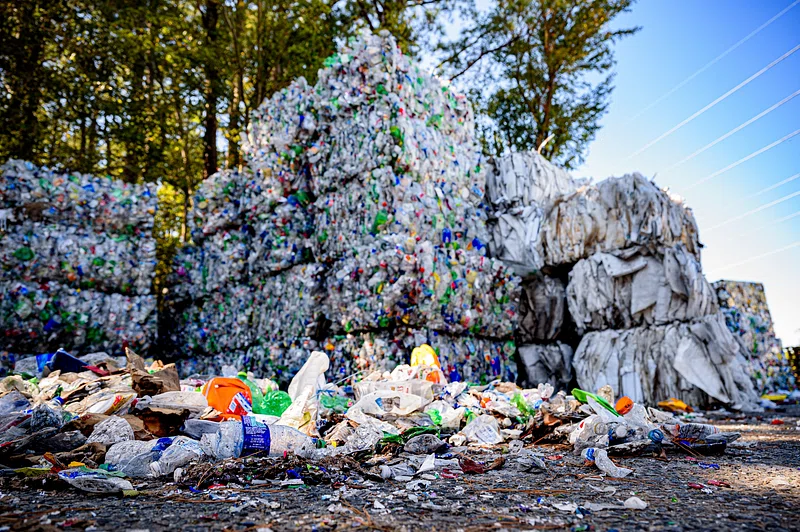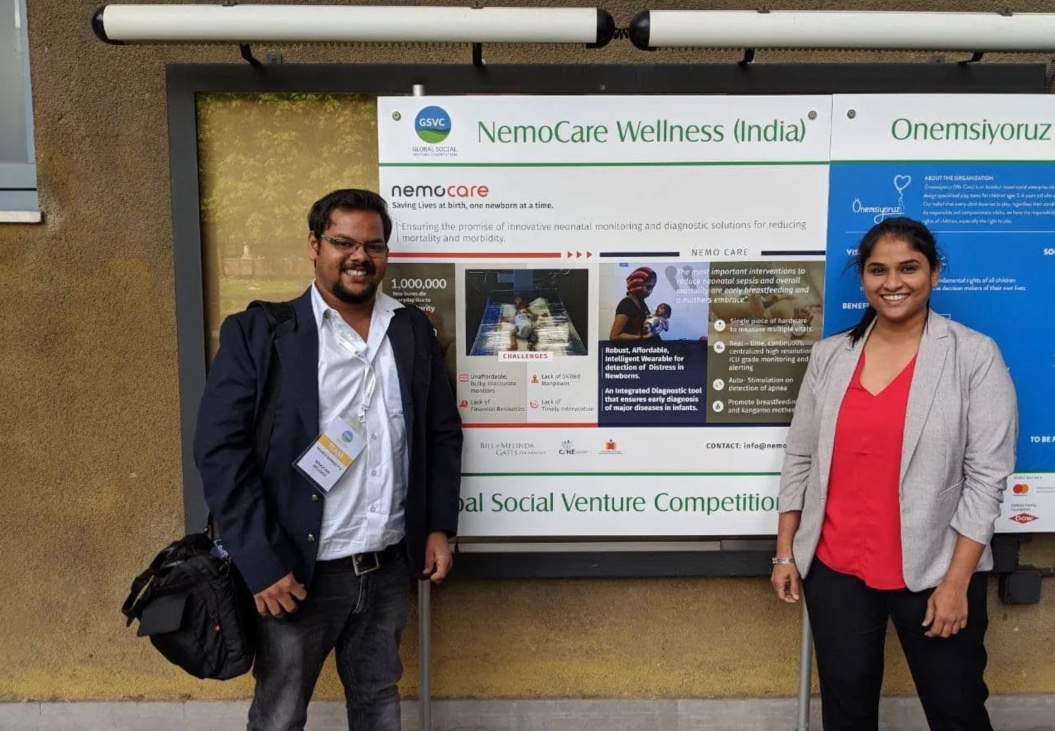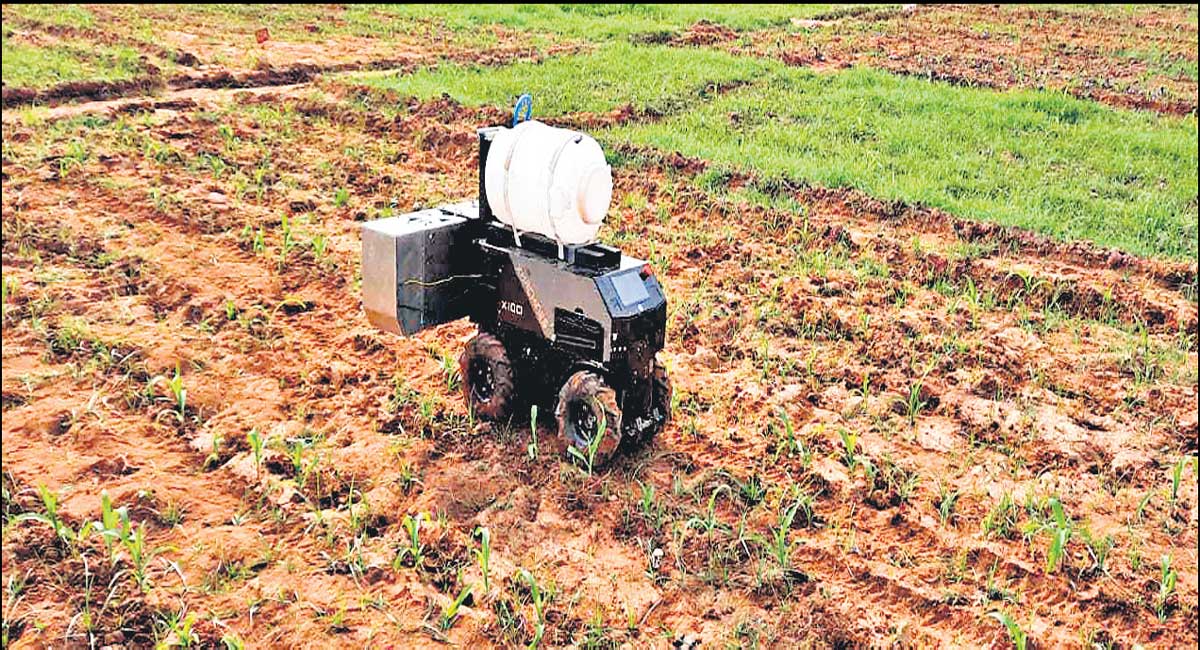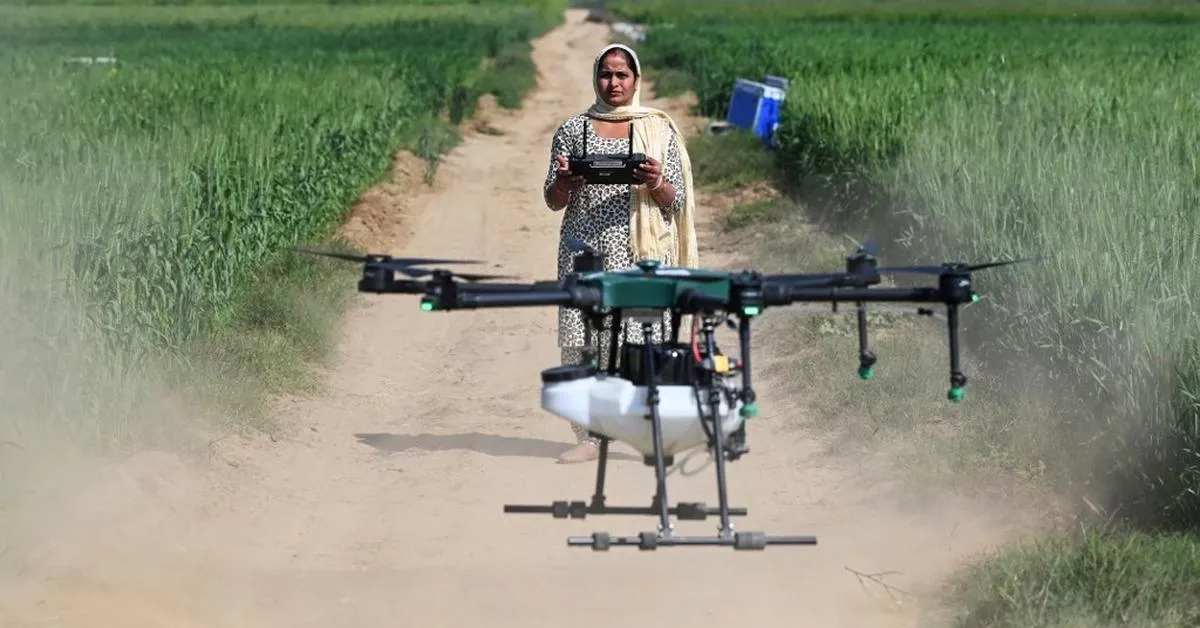
How AI Is Tackling India’s Waste Crisis for Cleaner, Healthier Cities
India generates over 1.7 lakh tons of waste daily, exposing over 1.5 million ragpickers to toxic materials. SUKA(R), an AI-powered sorting machine by Ishitva, automates this hazardous work—sorting 6 tons of waste per hour with 99% accuracy. By reducing human exposure, it offers a scalable, tech-led solution to India’s growing public health and sanitation crisis.

Sector

Solution
Technology

State of Origin
Impact Metrics
6 tons of waste/hour
with >99% purity and 6 times faster sorting than manual labour.
Reduces time to just 1 hour
from 8, processing 3,000 tons of waste every day.
BUILD YOUR OWN
BUILD YOUR OWN
How can I implement this innovation effectively?
How is this innovation being adopted around the world?
Where else could this innovation make an impact?
Who has seen real results from using this innovation?
What insights do experts share about this innovation?
What policies support or influence this innovation?
How could this innovation evolve in the future?
Is this innovation accessible and inclusive for everyone?
How can I contribute to or participate in this innovation?
What resources can help me explore this innovation further?
Transforming Waste Management: Lessons from Implementing AI Sorting Technologies in India
The integration of AI-enabled waste sorting machines, such as Ishitva Robotic Systems’ SUKA(R) in Ahmedabad, signals a paradigm shift in India’s approach to solid waste management. These advanced systems, capable of processing up to six tons of waste per hour with over 99% sorting purity, directly address the inefficiencies and health hazards endemic to manual sorting—a task undertaken by more than 1.5 million ragpickers nationwide. By automating material identification based on type, grade, color, size, shape, and even brand, AI-powered solutions not only accelerate processing but also reduce human exposure to hazardous waste. However, scaling these innovations across India’s diverse urban and rural landscapes requires a nuanced understanding of infrastructural, social, and policy dynamics.
Integrating AI with Existing Waste Management Infrastructure
Successful deployment of AI sorting technologies hinges on their seamless integration into India’s heterogeneous waste management systems. Municipalities must assess compatibility with local waste streams and recycling processes, which often vary by region due to differences in consumption patterns and waste composition. The adaptability of machines like SUKA(R)—which can be customized to handle diverse waste types—has proven essential in pilot projects, enabling both urban and peri-urban areas to benefit from automation. Research from the Indian Institute of Technology (IIT) Delhi underscores the importance of modular design and interoperability, allowing AI systems to be retrofitted into legacy infrastructure without extensive overhauls. Furthermore, leveraging AI-generated data for route optimization and predictive maintenance has already reduced downtime by 20% in select Indian cities, demonstrating tangible operational benefits.
Capacity Building and Workforce Transition
The shift to AI-driven waste management necessitates targeted capacity building for both municipal staff and informal sector workers. Training programs must equip workers with the skills to operate, maintain, and troubleshoot advanced machinery, ensuring technology adoption is both efficient and sustainable. According to a 2023 study by the National Institute of Urban Affairs (NIUA), inclusive training initiatives that involve ragpickers in machine operation and data management not only enhance system performance but also facilitate social mobility and formalization of employment. However, experts caution that without robust social protection measures and skill development pathways, the transition could marginalize vulnerable workers. Partnerships between municipal bodies, NGOs, and technology providers are critical to designing curricula that are accessible, context-specific, and aligned with local languages and literacy levels.
Leveraging Data for Governance and Circular Economy Outcomes
AI-enabled sorting machines generate vast datasets on waste composition, processing efficiency, and material recovery rates. Harnessing this data can drive evidence-based policymaking and support the creation of digital platforms for waste tracking, compliance monitoring, and market linkages. For instance, the integration of AI data streams with municipal dashboards in Pune and Bengaluru has enabled real-time monitoring of collection routes, reducing operational costs and improving service delivery. Additionally, linking AI systems with recycling marketplaces fosters transparency and supports the circular economy by connecting waste generators, recyclers, and end-users. The Centre for Science and Environment (CSE) recommends establishing standardized data protocols and open-access repositories to maximize the utility of AI-generated insights across the sector.
Policy and Regulatory Enablers
India’s regulatory landscape, shaped by the Swachh Bharat Mission and Solid Waste Management Rules (2016), provides a foundational framework for AI adoption but requires targeted enhancements. Policy analysts from The Energy and Resources Institute (TERI) advocate for explicit guidelines on AI integration, digital data governance, and workforce transition support. Incentivizing technology adoption through subsidies, tax benefits, and public-private partnerships can accelerate scaling, particularly in municipalities grappling with legacy dumpsites. Moreover, embedding AI-enabled compliance monitoring within regulatory frameworks can strengthen environmental oversight and reduce illegal dumping. Pilot projects in collaboration with major plastic recyclers—already processing over 5,000 tons daily using AI—demonstrate the scalability potential when supported by enabling policies and financial mechanisms.
Addressing Challenges: Infrastructure, Localization, and Social Inclusion
Despite promising outcomes, several challenges persist. High upfront capital costs, digital infrastructure gaps, and the need for localized AI training datasets—tailored to India’s unique waste profiles—are significant barriers to widespread adoption. Experts from Vellore Institute of Technology highlight the importance of developing India-specific datasets to improve sorting accuracy, especially for complex and composite waste streams. Additionally, ensuring equitable access to technology for smaller municipalities and marginalized communities requires innovative financing models and user-centric design. Social scientists emphasize the necessity of participatory approaches, involving waste workers in technology design and deployment to safeguard livelihoods and promote social inclusion.
—
The implementation of AI-enabled waste sorting technologies in India is a multifaceted endeavor, demanding coordinated action across technological, institutional, and social domains. By focusing on infrastructure integration, capacity building, data-driven governance, supportive policy frameworks, and inclusive practices, India can harness the full potential of AI to transform its waste management landscape—improving efficiency, worker safety, and environmental outcomes.
AI and IoT: Shaping the Future of Global Waste Management
Across the world, artificial intelligence (AI) and the Internet of Things (IoT) are redefining how cities and nations tackle the mounting challenges of waste management. From Jakarta to Seoul and across European capitals, smart technologies are streamlining collection, automating sorting, and enabling data-driven decision-making to address the pressures of urbanization and environmental sustainability. These global experiences offer valuable lessons for India, where rapid urban growth, diverse waste streams, and a large informal sector demand context-specific, innovative solutions. By examining international models and adapting them to local realities, India stands poised to leapfrog traditional barriers and build a more efficient, inclusive, and sustainable waste management ecosystem.
Smart Waste Systems: Lessons from Indonesia, South Korea, and Europe
Countries at the forefront of AI-driven waste management have demonstrated the transformative impact of integrating technology at scale. In Indonesia, a landmark 2025 study documents the deployment of AI-powered waste classification and IoT-enabled smart bins, which have optimized collection routes, reduced landfill dependency, and improved recycling rates. Despite hurdles such as high upfront costs and gaps in digital infrastructure, these initiatives have yielded measurable gains in operational efficiency and environmental outcomes.
South Korea’s comprehensive smart waste systems combine RFID-tagged bins, automated sorting, and real-time analytics to incentivize recycling and minimize illegal dumping. European nations, particularly in Scandinavia and Western Europe, have institutionalized predictive analytics to forecast waste generation, dynamically allocate resources, and support circular economy objectives. Notably, AI-enabled logistics in smart cities have reduced transportation distances by up to 36.8% and cut operational costs by over 13%, underscoring the economic and environmental dividends of digital transformation.
Adapting Global Innovations to India’s Unique Context
While India shares many challenges with its global counterparts—such as urban congestion, legacy dumpsites, and rising waste volumes—its socio-economic landscape is distinct. The informal sector, responsible for a significant share of waste collection and recycling, operates alongside formal municipal systems. This duality necessitates AI solutions that are not only technologically robust but also socially inclusive.
The success of indigenous innovations like Ishitva’s SUKA(R) machine in Ahmedabad exemplifies how locally developed AI technologies can bridge global best practices and grassroots realities. By automating sorting and reducing manual labor risks, such systems enhance both efficiency and worker welfare. However, scaling these solutions requires addressing barriers such as digital literacy, infrastructure disparities, and the integration of informal workers into formal value chains.
Policy and Governance: Building an Enabling Ecosystem
International experience highlights the critical role of policy frameworks, investment in digital infrastructure, and cross-sectoral collaboration in driving AI adoption. The European Union’s Circular Economy Action Plan and South Korea’s Smart Waste Management Strategy both emphasize regulatory clarity, data governance, and public-private partnerships as prerequisites for success.
For India, aligning existing policies—such as the Solid Waste Management Rules (2016) and the Swachh Bharat Mission—with AI-specific guidelines is essential. This includes establishing standards for data privacy, algorithmic transparency, and system interoperability. Incentivizing innovation through grants, pilot programs, and capacity-building initiatives can accelerate the uptake of AI, particularly in municipalities grappling with legacy waste and resource constraints.
Ethical and Social Dimensions: Ensuring Equity and Inclusion
Globally, the deployment of AI in waste management raises important ethical considerations, including data privacy, equitable access, and environmental justice. These issues are especially salient in India, where marginalized communities and informal workers form the backbone of the waste sector. International frameworks advocate for participatory approaches that involve all stakeholders—from ragpickers to municipal officials—in the design and implementation of AI systems.
Ensuring that AI does not exacerbate existing inequalities but rather serves as a tool for empowerment is a central policy challenge. This entails developing targeted training programs, providing social protection measures, and embedding accessibility features in technology design. Transparent data practices and open communication can build trust and facilitate smoother transitions for affected communities.
Expert Perspectives: Indian Insights on Global Trends
Indian researchers and practitioners are increasingly contributing to the global discourse on AI-enabled waste management. Experts from institutions such as the Vellore Institute of Technology emphasize the importance of localized datasets and transfer learning to enhance the accuracy of AI models in India’s heterogeneous waste landscape. Environmental scientists advocate for the integration of AI with IoT for real-time monitoring, drawing on successful pilots in both Indonesia and Indian cities.
Policy analysts highlight the potential of AI to support regulatory compliance, fraud prevention, and the achievement of Environmental, Social, and Governance (ESG) targets. They recommend embedding AI within a broader circular economy framework to maximize resource recovery and sustainability. Industry leaders in Indian recycling firms report that AI-powered sorting has improved product quality and market competitiveness, reinforcing the business case for further investment.
Collectively, these perspectives underscore the need for a multidisciplinary, inclusive, and policy-supported approach to AI adoption in India’s waste sector. By learning from global successes and adapting them to local realities, India can position itself as a leader in sustainable waste management innovation.
AI’s Expanding Role in Waste Management: Beyond Sorting to Systemic Solutions
Artificial intelligence is rapidly transforming the landscape of waste management in India, moving far beyond basic sorting to encompass a spectrum of innovative applications. From tackling the mounting challenge of electronic waste to optimizing collection logistics and enhancing waste-to-energy conversion, AI is emerging as a cornerstone technology for sustainable urban development. As India grapples with rising waste volumes, particularly in its megacities, the deployment of AI-driven systems offers the promise of greater efficiency, environmental protection, and social inclusion. This section explores the most significant, research-backed applications of AI in Indian waste management, highlighting both technological advances and their broader policy implications.
AI-Driven E-Waste Identification and Segregation
India’s digital revolution has brought with it a surge in electronic waste, posing severe environmental and health risks due to hazardous components. AI-powered mobile robots and vision-based systems are now being piloted to address this challenge. These technologies leverage deep learning algorithms to identify, classify, and segregate e-waste from mixed waste streams with high precision. According to researchers at the Vellore Institute of Technology, integrating transfer learning and localized datasets significantly enhances the accuracy of these systems in Indian contexts, where product types and waste compositions differ from global norms. Early deployments in urban centers have demonstrated reductions in manual handling of toxic materials, thereby improving worker safety and enabling higher rates of material recovery for recycling. As e-waste continues to proliferate, scaling such AI solutions will be critical for both environmental compliance and resource conservation.
Smart Waste Bins and Autonomous Collection Optimization
The integration of AI with sensor-equipped smart bins is reshaping waste collection in Indian cities and educational institutions. These bins use a combination of image recognition, weight sensors, and real-time analytics to autonomously sort waste at the point of disposal. Pilot projects in Indian universities and select urban wards have shown that AI-enabled bins can increase recycling rates by up to 30%, while also generating data to optimize collection routes and schedules. By predicting fill levels and waste composition, these systems help municipalities reduce unnecessary trips, lower fuel consumption, and minimize landfill burden. The deployment of such technology is especially relevant for smart city initiatives and large campuses, where embedding sustainability into daily operations is a policy priority. Research from the Indian Institute of Science underscores the importance of hybrid sensor approaches—combining visual, olfactory, and weight data—to improve sorting accuracy in the diverse waste streams typical of Indian settings.
Predictive Maintenance and Operational Reliability
AI’s predictive analytics capabilities are being harnessed to improve the reliability and cost-effectiveness of waste management infrastructure. By analyzing sensor data from collection vehicles, compactors, and sorting machines, AI models can forecast equipment failures and schedule maintenance proactively. Municipalities in states such as Maharashtra and Tamil Nadu have reported significant reductions in downtime and maintenance costs following the adoption of AI-driven predictive maintenance systems. This not only ensures uninterrupted waste collection services but also extends the lifespan of expensive machinery. The Centre for Science and Environment notes that such innovations are particularly valuable for cash-strapped urban local bodies, enabling them to do more with limited resources and improving overall service delivery.
Waste Generation Forecasting and Resource Allocation
Accurately predicting waste generation patterns is essential for effective municipal planning, especially in India’s densely populated cities where volumes fluctuate with festivals, migration, and seasonal changes. AI-powered modeling tools analyze historical data, demographic trends, and even social media signals to forecast peak waste periods. This allows city managers to allocate resources—such as manpower, vehicles, and processing capacity—more efficiently. Studies by the National Institute of Urban Affairs highlight the role of AI in enabling dynamic, data-driven decision-making, which is crucial for minimizing overflow, illegal dumping, and environmental hazards. Such forecasting tools are also being integrated into disaster management protocols, helping cities prepare for sudden surges in waste following natural calamities.
Enhancing Waste-to-Energy Processes Through AI Integration
AI is also making inroads into the optimization of waste-to-energy (WTE) technologies, a key component of India’s renewable energy and circular economy strategies. By combining AI with advanced chemical analysis, operators can better control processes like pyrolysis and gasification, leading to more accurate carbon emission estimates and improved energy conversion efficiency. Research collaborations between Indian Institutes of Technology and public sector undertakings have demonstrated that AI-driven process optimization can increase energy yields while reducing harmful emissions. This not only supports India’s commitments under the Paris Agreement but also provides a viable pathway for managing non-recyclable waste fractions.
Policy and Ecosystem Implications
The breadth of AI applications in waste management underscores the need for a supportive policy ecosystem. Indian policymakers are increasingly recognizing the importance of research funding, pilot programs, and regulatory frameworks tailored to AI innovation. Experts from the National Environmental Engineering Research Institute advocate for clear guidelines on data governance, algorithmic transparency, and workforce transition to ensure that technological advances translate into inclusive, scalable solutions. Public-private partnerships and capacity-building initiatives will be essential to bridge gaps in digital infrastructure and human capital, particularly in smaller municipalities and the informal sector.
Collectively, these related applications illustrate AI’s transformative potential in addressing India’s complex waste management challenges. By fostering an environment that encourages experimentation, safeguards social equity, and prioritizes environmental outcomes, India can harness AI as a powerful tool for sustainable urban futures.
AI-Driven Waste Management: Transformative Impact Stories from India
The deployment of AI-powered sorting technologies, such as SUKA(R), is reshaping the landscape of waste management in Indian cities like Ahmedabad. By automating the processing of over 5,200 tons of waste daily with remarkable precision, these systems are not only enhancing operational efficiency but also delivering profound social, economic, and environmental benefits. From alleviating the hazardous conditions faced by ragpickers to catalyzing new employment opportunities and advancing India’s climate goals, these impact stories illustrate the multifaceted value of integrating artificial intelligence into urban waste systems.
Accelerating Efficiency and Economic Viability
AI-enabled sorting machines have dramatically reduced the time required for waste segregation, leading to faster recycling cycles and decreased landfill dependency. Research conducted in Ahmedabad indicates that automated systems can achieve sorting purity rates exceeding 95%, significantly outperforming manual methods. This heightened efficiency translates into reduced operational costs for municipal bodies and private recyclers, making recycling ventures more economically sustainable. The increased throughput also supports the scalability of recycling operations, enabling cities to manage growing volumes of waste without proportional increases in labor or infrastructure. These advancements are particularly crucial for urban centers grappling with rapid population growth and mounting waste generation.
Social Transformation: From Informal Labor to Skilled Employment
The introduction of AI in waste management is fostering a paradigm shift within the informal sector, which has traditionally relied on manual ragpicking. Automation is reducing the physical and health risks associated with waste sorting, as documented by field studies in Gujarat and Maharashtra. Importantly, the technology is creating new roles in machine operation, maintenance, and data analytics, offering pathways for skill development and formal employment. However, this transition necessitates targeted training programs and social protection measures to ensure that marginalized workers are not left behind. Initiatives led by NGOs and municipal governments, such as digital literacy workshops and upskilling courses, are beginning to bridge this gap, promoting inclusivity and upward mobility within the sector.
Environmental Gains: Advancing Circularity and Climate Action
Enhanced sorting accuracy achieved through AI has led to a marked reduction in contamination of recyclable materials. This improvement not only elevates the quality of recycled outputs but also minimizes the volume of waste diverted to landfills or incinerators. According to environmental assessments aligned with India’s Nationally Determined Contributions (NDCs), these advancements contribute to lower greenhouse gas emissions and support the nation’s broader climate commitments. Pilot projects in Indian universities, where smart waste bins and AI-driven monitoring systems have been implemented, report increased recycling rates and heightened environmental awareness among students and staff. Such educational settings are emerging as critical nodes for innovation diffusion and behavior change, amplifying the environmental impact of AI adoption.
Expert Perspectives: Indian Insights on AI Integration
Indian experts underscore the importance of robust data quality, algorithmic transparency, and system interoperability for successful AI deployment in waste management. Researchers from the Vellore Institute of Technology advocate for the use of transfer learning and mobile robotics, emphasizing the need for localized datasets to enhance model accuracy in diverse Indian contexts. Environmental scientists highlight the synergy between AI and IoT for real-time waste monitoring and predictive analytics, which can optimize collection routes and reduce operational costs—a trend corroborated by pilot studies in both India and Indonesia. Policy analysts recommend embedding AI within a circular economy framework to maximize resource recovery and regulatory compliance. Social scientists, meanwhile, stress the necessity of participatory approaches that involve informal sector workers in the design and implementation of AI solutions, ensuring equitable outcomes. Industry leaders from Indian recycling firms report that AI-enabled sorting has improved product quality and market competitiveness, reinforcing the business case for continued investment in intelligent waste management technologies.
Scaling Impact: Lessons for Broader Adoption
The success stories emerging from Indian cities and institutions highlight the transformative potential of AI in waste management, but also underscore the need for strategic scaling. Integrating social and environmental metrics into impact assessments is essential for capturing the full spectrum of benefits and guiding policy development. Scaling successful pilots requires not only technological investment but also supportive regulatory frameworks, capacity-building initiatives, and inclusive stakeholder engagement. As India continues to urbanize and confront complex waste management challenges, the lessons learned from these pioneering efforts offer a roadmap for replicating and amplifying impact across diverse urban and rural settings.
Voices Shaping the Future: Indian Experts on AI in Waste Management
India’s journey toward smarter, more sustainable waste management is being shaped by a diverse array of experts—from academic researchers and environmental scientists to policy analysts, social scientists, and industry leaders. Their insights reveal both the promise and the complexity of deploying artificial intelligence (AI) in India’s unique waste ecosystem. Drawing on leading Indian institutions and field experiences, this section synthesizes expert perspectives on the technical, social, and policy dimensions critical to AI’s success in transforming waste management.
Data Quality and Localized AI: Foundations for Effective Deployment
Indian researchers consistently highlight the foundational importance of high-quality, context-specific data for AI systems in waste management. Scholars at Vellore Institute of Technology have demonstrated that transfer learning and mobile robotics can significantly enhance the segregation of e-waste—a rapidly growing challenge in Indian cities. However, their studies underscore that AI models trained on generic or foreign datasets often underperform in Indian conditions due to differences in waste composition, packaging, and informal sector practices. As Dr. Priya Sharma, a lead researcher in AI for urban systems, notes, “Localized datasets are not just beneficial—they are essential for accurate waste identification and sorting in India’s heterogeneous waste streams.” The call for robust data collection and annotation, tailored to Indian realities, is echoed by experts at the Indian Institute of Science (IISc), who advocate for collaborative data-sharing frameworks between municipalities, research institutions, and technology providers.
Integrating AI with IoT: Real-Time Monitoring and Operational Efficiency
Environmental scientists and engineers from the Indian Institute of Technology (IIT) Delhi and the National Environmental Engineering Research Institute (NEERI) have been at the forefront of integrating AI with Internet of Things (IoT) technologies for waste management. Their pilot projects in cities like Pune and Indore have demonstrated that AI-powered sensors and IoT-enabled bins can provide real-time data on waste levels, enabling dynamic route optimization for collection vehicles. This not only reduces operational costs but also minimizes fuel consumption and emissions. Dr. Rakesh Kumar of NEERI emphasizes, “The synergy of AI and IoT allows for predictive analytics—anticipating waste generation patterns and equipment maintenance needs, which is crucial for scaling smart waste management in Indian cities.” However, these experts caution that the benefits of such integration are contingent on the availability of robust digital infrastructure and reliable connectivity, which remain uneven across urban and rural India.
Policy and Governance: Embedding AI within the Circular Economy
Policy analysts from the Centre for Policy Research (CPR) and the Energy and Resources Institute (TERI) argue that AI’s transformative potential in waste management extends well beyond operational improvements. Their research points to AI’s role in enhancing regulatory compliance, detecting fraud in waste handling, and supporting the attainment of Environmental, Social, and Governance (ESG) objectives. Dr. Anjali Mehta of TERI advocates for embedding AI within a broader circular economy framework, stating, “AI can optimize resource recovery and traceability, but its impact is maximized when aligned with circular economy principles and supported by enabling policies.” These experts recommend that Indian policymakers develop explicit guidelines for AI adoption, including standards for data privacy, algorithmic transparency, and interoperability. They also highlight the need for targeted incentives—such as grants and public-private partnerships—to accelerate AI innovation, particularly in municipalities grappling with legacy waste challenges.
Social Inclusion: Engaging the Informal Sector in AI Transitions
India’s waste management landscape is characterized by the significant role of the informal sector, including ragpickers and waste workers. Social scientists from Tata Institute of Social Sciences (TISS) and the All India Kabadi Mazdoor Mahasangh emphasize that technological interventions must be inclusive and participatory. Their fieldwork reveals that top-down deployment of AI solutions can inadvertently marginalize informal workers unless their voices and expertise are integrated into technology design and implementation. Dr. Sunita Narain, Director General of the Centre for Science and Environment (CSE), asserts, “Participatory approaches—where waste workers are co-designers and beneficiaries of AI systems—are essential for ensuring equitable outcomes and social acceptance.” Initiatives such as digital literacy training, skill certification, and the creation of digital platforms for informal sector engagement are recommended to bridge the digital divide and foster inclusive growth.
Industry Insights: AI as a Catalyst for Competitiveness and Quality
Industry leaders from Indian plastic recycling and waste processing firms are increasingly adopting AI-powered sorting machines to improve product quality and operational efficiency. Companies such as Nepra Resource Management and Recykal report that AI-enabled systems have enhanced the precision of material separation, reduced contamination rates, and improved the market value of recycled products. According to Mr. Rajesh Bansal, CEO of a leading waste management enterprise, “Investing in AI has not only streamlined our processes but also positioned us competitively in both domestic and export markets.” These industry experiences reinforce the business case for AI adoption, while also highlighting the need for ongoing investment in workforce training and system maintenance to sustain technological gains.
—
Collectively, these expert perspectives underscore that India’s AI-driven waste management strategies must be multidisciplinary, context-sensitive, and anchored in strong policy and social frameworks. Success will depend on the interplay between technological innovation, inclusive participation, and sustained institutional support. For in-depth analyses and further expert commentary, refer to: [Artificial intelligence for waste management in smart cities]().
Harnessing Policy for an AI-Driven Waste Management Revolution in India
India stands at a pivotal moment in its waste management journey. The country’s robust policy landscape—anchored by the Solid Waste Management Rules (2016) and the Swachh Bharat Mission—has laid the groundwork for scientific processing, source segregation, and resource recovery. These priorities align closely with the transformative potential of artificial intelligence (AI), which promises to revolutionize waste sorting, operational efficiency, and environmental compliance. Yet, as the nation contemplates scaling AI integration, policy frameworks must evolve to address emerging technological, social, and ethical imperatives.
Bridging Policy Gaps: From Foundational Rules to AI-Readiness
While India’s existing waste management policies are progressive in their intent, they remain largely silent on the explicit adoption of AI and digital technologies. The absence of clear guidelines on data governance, algorithmic transparency, and interoperability standards poses significant barriers to trust and scalability. According to the Centre for Science and Environment (CSE), integrating AI-specific provisions—such as protocols for data privacy, explainability, and secure data sharing—would not only foster public confidence but also ensure responsible innovation. Furthermore, policy must address the workforce transition by mandating reskilling and capacity-building initiatives for municipal staff and informal sector workers, thereby minimizing displacement and promoting inclusive growth.
Incentivizing Innovation: Financial and Institutional Levers
To catalyze AI adoption, policy frameworks should deploy targeted incentives, including grants, subsidies, and tax benefits for municipalities and private actors investing in AI-driven solutions. The NITI Aayog has advocated for public-private partnerships (PPPs) to accelerate technology transfer, particularly in cities grappling with legacy dumpsites and high waste volumes. Pilot projects in Pune and Hyderabad have demonstrated that financial support, coupled with institutional collaboration, can significantly enhance the deployment of AI-powered waste sorting and tracking systems. Additionally, establishing innovation sandboxes and regulatory fast-tracks can encourage startups and research institutions to develop context-specific AI applications for diverse Indian waste streams.
Strengthening Environmental Compliance Through Digital Monitoring
AI-enabled monitoring systems offer a powerful tool for enforcing environmental regulations and curbing illegal dumping. Mandating the use of AI-powered sensors, computer vision, and geospatial analytics can provide real-time data on waste flows, landfill operations, and compliance with disposal norms. The Indian Institute of Technology (IIT) Delhi’s pilot initiatives have shown that integrating AI with blockchain technology enhances traceability and accountability, creating tamper-proof records of waste transactions. Policymakers should consider making such digital monitoring systems a statutory requirement, thereby strengthening regulatory oversight and enabling data-driven decision-making at municipal and state levels.
Advancing Circular Economy Goals with AI Integration
India’s commitment to circular economy principles—maximizing resource recovery, minimizing landfill dependency, and promoting sustainable urbanization—can be significantly bolstered by AI. Advanced machine learning algorithms can optimize material recovery facilities, improve the sorting of complex and hazardous wastes, and enable predictive analytics for waste generation trends. The Confederation of Indian Industry (CII) highlights that AI-driven platforms can facilitate secondary raw material markets, supporting both environmental sustainability and economic growth. Policy interventions should prioritize the integration of AI into circular economy strategies, including extended producer responsibility (EPR) frameworks and green procurement policies.
Expert Perspectives: Indian Thought Leadership on AI and Waste Management
Indian experts and institutions are increasingly shaping the discourse on AI in waste management. Dr. Sunita Narain of CSE emphasizes the need for “people-centric” AI policies that prioritize social inclusion and environmental justice. The Indian Institute for Human Settlements (IIHS) advocates for participatory policy development, ensuring that the voices of informal workers and marginalized communities are reflected in regulatory design. The National Institute of Urban Affairs (NIUA) recommends embedding digital literacy and accessibility standards into AI deployment guidelines to bridge the digital divide. Collectively, these perspectives underscore the importance of a holistic policy approach—one that balances technological innovation with ethical governance and social equity.
In conclusion, India’s policy architecture must rapidly evolve to harness the full potential of AI in waste management. By bridging regulatory gaps, incentivizing innovation, strengthening compliance, and advancing circularity, policymakers can lay the foundation for an inclusive, sustainable, and technologically advanced waste management ecosystem. The integration of Indian expertise and participatory governance will be crucial in navigating this complex transition and ensuring that AI serves as a force for public good.
Charting the Next Frontier: AI’s Transformative Trajectory in Indian Waste Management
India stands at the cusp of a revolution in waste management, powered by rapid advances in artificial intelligence (AI). As urbanization accelerates and waste streams diversify, AI-driven solutions promise to address long-standing inefficiencies, environmental hazards, and social inequities. The coming decade could witness a paradigm shift—where intelligent systems not only optimize operations but also empower marginalized communities and foster sustainable, circular economies. This section explores the most promising, research-backed avenues shaping the future of AI in Indian waste management.
Precision Sorting and Hazardous Waste Identification
Recent breakthroughs in machine learning and computer vision are enabling unprecedented accuracy in waste sorting, a critical challenge in India’s heterogeneous waste landscape. AI-powered robotic systems, trained on vast datasets of local waste profiles, can now distinguish between complex materials—including hazardous, biomedical, and composite wastes—at high speed and with minimal human intervention. According to research from the Indian Institute of Technology (IIT) Delhi, such systems can increase recycling rates by up to 30% while reducing worker exposure to toxic materials. The deployment of these technologies in pilot projects across Bengaluru and Pune has demonstrated not only improved material recovery but also enhanced safety protocols, setting new benchmarks for urban waste management.
Smart Cities: Real-Time Monitoring and Predictive Analytics
The integration of AI with Internet of Things (IoT) networks is redefining how Indian cities manage waste. Smart sensors embedded in bins and collection vehicles generate real-time data on waste levels, composition, and collection patterns. AI algorithms analyze this data to optimize collection routes, predict waste generation hotspots, and schedule preventive maintenance for equipment—reducing operational costs and minimizing environmental impact. The Smart Cities Mission, spearheaded by the Ministry of Housing and Urban Affairs, has begun piloting such AI-enabled platforms in cities like Surat and Indore, resulting in measurable reductions in fuel consumption and landfill overflow incidents. As these systems mature, they are expected to form the backbone of resilient, adaptive urban waste management infrastructures.
Waste-to-Energy: AI for Circular Economy and Climate Goals
India’s ambitious renewable energy targets and circular economy aspirations are driving innovation in waste-to-energy (WtE) technologies. AI is playing a pivotal role in optimizing processes such as pyrolysis, anaerobic digestion, and incineration. By analyzing feedstock characteristics and operational parameters in real time, AI models can maximize energy yields while minimizing harmful emissions. The National Environmental Engineering Research Institute (NEERI) has conducted studies indicating that AI-assisted WtE plants can reduce carbon emissions by up to 20% compared to conventional systems. Furthermore, AI-powered emission monitoring tools ensure regulatory compliance and public transparency, aligning WtE projects with both environmental and social objectives.
Blockchain and Big Data: Transparent, Tamper-Proof Waste Tracking
The convergence of AI with blockchain and big data analytics is set to revolutionize waste traceability and regulatory compliance in India. Blockchain-enabled platforms, underpinned by AI-driven data validation, can create immutable records of waste generation, transportation, and processing. This transparency is crucial for enforcing Extended Producer Responsibility (EPR) mandates and building consumer trust in recycling claims. Research collaborations between the Indian Institute of Science (IISc) and industry partners have piloted blockchain-based e-waste tracking systems in Karnataka, demonstrating improved accountability and reduced instances of illegal dumping. As these technologies scale, they promise to bring unprecedented integrity to India’s waste management ecosystem.
Expert Perspectives: Empowering the Informal Sector through AI
India’s waste management workforce is predominantly informal, with millions of ragpickers and recyclers playing a vital yet precarious role. AI-driven digital platforms offer new avenues for empowerment—facilitating access to digital marketplaces, skill certification, and social security schemes. Dr. Sunita Narain of the Centre for Science and Environment (CSE) emphasizes the importance of participatory design, noting that “AI must be harnessed to uplift, not displace, informal workers.” Initiatives like Hasiru Dala in Bengaluru are leveraging AI to match waste workers with collection opportunities, track earnings, and provide real-time safety alerts. These efforts, supported by Tata Trusts and the All India Kabadi Mazdoor Mahasangh, illustrate how inclusive AI deployment can foster social mobility and dignified livelihoods.
Navigating Challenges: Governance, Ethics, and Research Priorities
While the promise of AI in waste management is immense, it is not without challenges. The digital divide—marked by disparities in access to technology and digital literacy—risks excluding marginalized communities. Data privacy, algorithmic bias, and ethical use of AI require robust governance frameworks and transparent oversight. Indian policymakers, led by NITI Aayog and the Department of Science & Technology, are developing guidelines for responsible AI deployment, emphasizing stakeholder engagement and local context adaptation. Investment in research and innovation ecosystems, alongside pilot projects in diverse settings—from megacities to rural clusters—will be essential to ensure that AI-driven waste management is both effective and equitable.
Bridging the Accessibility Gap in AI-Driven Waste Management
As India accelerates its adoption of AI-enabled waste management systems, ensuring equitable access to these technologies emerges as a foundational requirement. The nation’s waste management workforce is predominantly composed of individuals from marginalized communities, many of whom face barriers related to digital literacy, affordability, and infrastructural deficits. Without deliberate and research-informed interventions, the promise of AI risks deepening existing inequalities rather than alleviating them. Addressing accessibility is therefore not merely a technical consideration, but a socio-economic imperative that must inform every stage of AI deployment in waste management.
Designing for Marginalized and Diverse User Groups
Research consistently highlights the importance of inclusive design in technology adoption, particularly in contexts marked by social and economic disparities. In India, waste workers often include women, Dalits, and migrants, many of whom have limited experience with digital interfaces. Studies by the Indian Institute of Technology (IIT) Delhi and the Centre for Internet and Society emphasize that user interfaces must be intuitive, support multiple Indian languages, and accommodate varying literacy levels. Ergonomic considerations are equally vital: AI-powered sorting machines and collection devices should be designed to suit the physical capabilities of women and differently-abled workers, reducing occupational hazards and enhancing usability. Such design principles not only foster adoption but also ensure that technological advancements translate into tangible improvements in working conditions.
Addressing Affordability and Infrastructure Barriers
Affordability remains a significant barrier, particularly for smaller municipalities and informal sector actors who lack the financial muscle of metropolitan corporations. According to a 2023 report by the Council on Energy, Environment and Water (CEEW), upfront costs of AI systems can be prohibitive for local bodies and waste cooperatives. Innovative financing models—such as public subsidies, shared infrastructure, and pay-per-use arrangements—are essential to democratize access. Furthermore, infrastructural gaps, including unreliable electricity, patchy internet connectivity, and limited maintenance services, disproportionately affect rural and peri-urban areas. The National Institute of Urban Affairs (NIUA) recommends integrating AI deployment with broader investments in digital and physical infrastructure to ensure that technological benefits reach underserved communities.
Data Accessibility, Transparency, and Community Trust
The success of AI in waste management hinges not only on technical efficacy but also on the trust and participation of stakeholders. Open data policies, as advocated by NITI Aayog, can foster transparency and accountability, enabling communities to monitor waste flows, system performance, and environmental impacts. Community engagement in data collection and validation—through citizen science initiatives or participatory mapping—can further democratize the benefits of AI. Research from the Indian School of Business (ISB) suggests that when data is accessible and transparent, stakeholders are more likely to trust and adopt new technologies, leading to more sustainable and inclusive outcomes.
Culturally Responsive Training and Capacity Building
Empowering waste workers to operate and maintain AI systems requires training programs that are both linguistically and culturally tailored. The All India Institute of Local Self-Government (AIILSG) has demonstrated that digital literacy initiatives are most effective when delivered in local languages and contextualized to workers’ lived realities. Training modules should incorporate hands-on demonstrations, peer learning, and ongoing support, ensuring that workers not only acquire technical skills but also develop confidence in using new tools. Such capacity building is critical for bridging the digital divide and enabling workers to transition from manual to technology-assisted roles, thereby enhancing both livelihoods and dignity.
Expert Perspectives: Embedding Accessibility in Policy and Practice
Indian policy experts and institutions increasingly recognize the centrality of accessibility in AI deployment. Dr. Shyamala Mani of the National Institute of Urban Affairs underscores the need for explicit accessibility guidelines in municipal procurement and implementation frameworks. The Ministry of Electronics and Information Technology (MeitY) has called for the integration of universal design principles and accessibility audits in all AI projects, particularly those targeting public services. Moreover, the Swachh Bharat Mission’s recent guidelines advocate for participatory planning and regular feedback mechanisms to ensure that AI solutions are responsive to the needs of all stakeholders, including informal waste workers. Embedding these principles in policy not only safeguards inclusivity but also enhances the sustainability and scalability of AI-driven waste management initiatives.
Unlocking Inclusive Progress: Pathways for Stakeholder Participation in AI-Driven Waste Management
The transformative potential of artificial intelligence (AI) in India’s waste management sector hinges on the active involvement of a diverse array of stakeholders. From municipal officials and private recyclers to informal waste workers, technology developers, academic institutions, and civil society organizations, each group brings unique perspectives and expertise. Ensuring their meaningful participation is not only a matter of equity but also a strategic imperative for designing effective, context-sensitive, and socially accepted AI solutions. This section explores research-backed opportunities for broad-based engagement, drawing on Indian case studies and expert insights to illuminate pathways for collaborative innovation.
Participatory Design: Centering Informal Workers in AI Solutions
India’s informal waste sector, comprising an estimated 1.5 to 4 million workers (Chaturvedi et al., 2021), plays a pivotal role in urban waste management. However, the integration of AI technologies often risks marginalizing these actors unless their voices are actively included in the design process. Participatory design workshops—such as those piloted by the Indian Institute for Human Settlements (IIHS)—have demonstrated that involving ragpickers and informal recyclers in co-creating AI tools leads to solutions that are more attuned to ground realities. These workshops surface critical insights on occupational safety, data privacy, and workflow integration, ensuring that technological interventions do not inadvertently displace livelihoods but instead enhance working conditions and social security. Research from the Centre for Policy Research (CPR) further underscores that participatory approaches foster trust and facilitate smoother transitions to technology-enabled systems.
Community Engagement: Building Public Awareness and Ownership
Public understanding and acceptance are essential for the success of AI-enabled waste management initiatives. Studies by the Centre for Science and Environment (CSE) reveal that community-led awareness campaigns significantly improve household waste segregation rates and reduce contamination in recycling streams. Leveraging digital and offline platforms, municipal authorities in cities like Pune and Bengaluru have launched targeted outreach programs to educate citizens on the benefits of AI-driven waste sorting, collection optimization, and real-time monitoring. Public consultations—such as town hall meetings and interactive exhibitions—provide forums for residents to voice concerns, offer feedback, and co-create local solutions. These participatory mechanisms not only demystify AI technologies but also foster a sense of shared responsibility and community ownership, which are critical for long-term sustainability.
Collaborative Innovation: Bridging Government, Industry, and Academia
Accelerating the development and deployment of AI solutions in waste management requires robust collaboration across sectors. The Atal Innovation Mission and the Smart Cities Mission have catalyzed partnerships between municipal bodies, technology startups, academic institutions, and industry leaders. Pilot projects—such as the AI-powered waste sorting system at the Indian Institute of Technology (IIT) Madras—demonstrate the value of academic testbeds for real-world experimentation and iterative improvement. These collaborations facilitate knowledge sharing, joint research, and capacity building, enabling the rapid scaling of successful models. The Confederation of Indian Industry (CII) has also played a key role in convening stakeholders to address regulatory, technical, and operational challenges, ensuring that innovation is both responsive to local needs and aligned with national policy objectives.
Digital Platforms: Enhancing Transparency and Citizen Feedback
The proliferation of digital platforms offers new avenues for citizen participation and oversight in waste management services. Mobile applications and online portals—such as Swachhata App and Clean India—enable residents to report service gaps, track waste collection schedules, and provide real-time feedback to municipal authorities. Research by the National Institute of Urban Affairs (NIUA) indicates that such platforms increase transparency, responsiveness, and accountability, leading to measurable improvements in service delivery. Furthermore, the integration of AI-powered analytics allows for the aggregation and analysis of citizen inputs, informing data-driven decision-making and targeted interventions. These digital tools democratize access to information and empower citizens to play an active role in shaping urban waste management systems.
Expert Perspectives: Insights from Indian Thought Leaders
Indian experts and institutions have been at the forefront of advocating for inclusive, ethical, and context-sensitive approaches to AI in waste management. Dr. Shyamala Mani of the National Institute of Urban Affairs emphasizes the importance of multi-stakeholder policy forums for deliberating on data governance, ethical AI use, and workforce transition strategies. The Energy and Resources Institute (TERI) has highlighted the need for regulatory frameworks that protect informal workers’ rights while incentivizing technological innovation. Meanwhile, the Indian Institute of Science (IISc) has called for the establishment of living labs and innovation challenges to encourage startups and entrepreneurs to develop AI solutions tailored to India’s diverse waste streams. These expert perspectives underscore the critical role of participatory governance and continuous dialogue in ensuring that AI-driven waste management advances both efficiency and social inclusion.
In summary, unlocking the full potential of AI in India’s waste management sector requires a concerted effort to foster participation across all stakeholder groups. By embedding participatory design, community engagement, cross-sectoral collaboration, digital feedback mechanisms, and expert-led policy dialogue into the fabric of AI initiatives, India can chart a path toward more equitable, effective, and sustainable waste management systems.
Startup Develops AI Robot That Segregates 5 Tonnes of Waste In India – https://thebetterindia.com/230278/india-startup-innovation-ai-robot-waste-segregation-automatic-technology-ahmedabad-india-gop94/
Waste Management Robotics Startup Ishitva Bags $1 Million – https://www.cioinsiderindia.com/news/waste-management-robotics-startup-ishitva-bags-1-million-nwid-3388.html
Application of artificial intelligence to enhance collection of E-waste – https://pubmed.ncbi.nlm.nih.gov/34726090/
If you would like to know more about this innovation, fill this form to contact the innovator.
Handpicked stories tailored just for you
Explore stories that inspire, inform, and ignite new ideas across tech, innovation, and real-world impact










